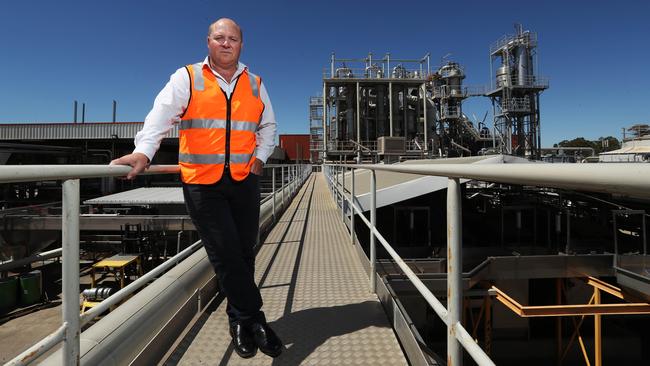Manufacturing jobs warning over gas price crunch
Energy companies are cashing in on limited supply by doubling prices with a message to customers: take it or leave it.

Manufacturers are warning of job losses and a collapse in investment across the country as a doubling in gas prices for some businesses adds millions to their energy costs, stoking federal government calls for states to lift restrictions that stymie new gas developments.
With some energy retailers telling industrial customers to “take it or leave it’’ as they negotiate new gas supply contracts with steep increases, taking advantage of a market facing tight supply, the Turnbull government yesterday demanded NSW, Victoria and the Northern Territory lift restrictions on new gas developments.
Domestic demand for gas and exports combined are forecast to exceed supply from existing reserves next year.
Energy Minister Josh Frydenberg said the “clear and consistent’’ message was Australia needed more gas and more gas suppliers. “Sensitive as we should be to the needs of landowners and the environment, we can unlock our gas reserves in a sustainable way by lifting the state moratoriums and bans currently in place,” Mr Frydenberg said.
Regional manufacturers, including the country’s largest tomato products producer and the largest domestic wool processor, are warning they could halt investments amid concerns the sustainability of their businesses are being called into question by the price increases.
Victoria Wool Processors and tomato products processor Kagome Australia have revealed significant rises, of up to 100 per cent, in gas costs for the coming year as limited supplies and a booming export trade push prices higher.
The Australian can reveal Kagome has seen its gas costs increase from $2.2 million last year to $3.6m this year. The company, with 210 full-time staff based in the Murray River town of Echuca, has warned the continued increase in pricing “will almost certainly have an effect on employee numbers”.
Kagome chief executive Jason Fritsch said it became apparent after the company entered negotiations with retailers last year that “there was no negotiation, and it came down to a ‘take it or leave it’ option largely because there wasn’t any gas to supply”.
“We did not have an option of contracting for a 12-month period; we had to take a two-year period with another price increase next year,” Mr Fritsch said.
“Over the last three years, gas demand has tripled largely due to an increase in export, without an accompanying increase in the supply of gas to meet this additional demand. I acknowledge there is complexity around introducing additional supply, but we need our state and federal governments working together to find a way. We cannot wait for five years; we need to have some serious investment in energy, and when I say energy I mean the enthusiasm to explore an appropriate and agreeable supply.”
The Victorian government last year banned unconventional gas exploration, including the controversial process of hydraulic fracturing, and extended a moratorium on onshore conventional gas exploration until the end of the decade. In NSW, the Baird government excluded all but a small portion of the state from unconventional gas exploration, although it is expected to announce a new policy that would open up larger swathes of land to mining companies. The Northern Territory has also implemented a moratorium on fracking.
The moves come despite the Australian Competition & Consumer Commission, following a lengthy inquiry last year, concluding supply from existing reserves would be insufficient to meet domestic demand by next year.
“Unless measures are taken to change the supply outlook in these states, gas users are likely to face uncompetitive pricing outcomes,” the report found.
Mr Frydenberg said lifting moratoriums on new gas developments would be important and complement recent reforms agreed at a COAG meeting to improve competition in the gas pipeline sector. “And to do so will put downward pressure on prices, enhance energy security and help smooth the transition to a lower emission future,” he said.
Victoria Wool Processors, with 30 employees based on Melbourne’s rural fringe, said it received just one gas supply offer this year, with its bill doubling from $600,000 to $1.2m. “Almost all of our revenue is from exports, our industry had 21 plants in 2001 and now we are down to three, but we have been able to compete where we are clearly paying (higher) wages and to a certain extent that’s been allowed for by having cheap energy,” said David Ritchie, the plant’s general manager.
“Now we’re paying world parity prices or above for both electricity and gas, and for an export business that raises the question of why is it we are still in Australia. Certainly, we wouldn’t invest and we’ve put off a $500,000 wastewater system as we assess the viable of staying in the country.”
At least one other major manufacturer, which did not want to be named, is expected to be paying twice what it was for gas this year.
Australian Petroleum Production and Exploration Association chief executive Malcolm Roberts said governments that pursued bans were “manufacturing a supply crisis, which will mean higher energy costs and job losses”.
“Production from our established fields will soon peak,” Mr Roberts said. “More and more, we are relying on coal-seam gas to supply local industry. If we don’t stop the politics, we will strangle major parts of our manufacturing sector and slug households with higher bills.”




To join the conversation, please log in. Don't have an account? Register
Join the conversation, you are commenting as Logout